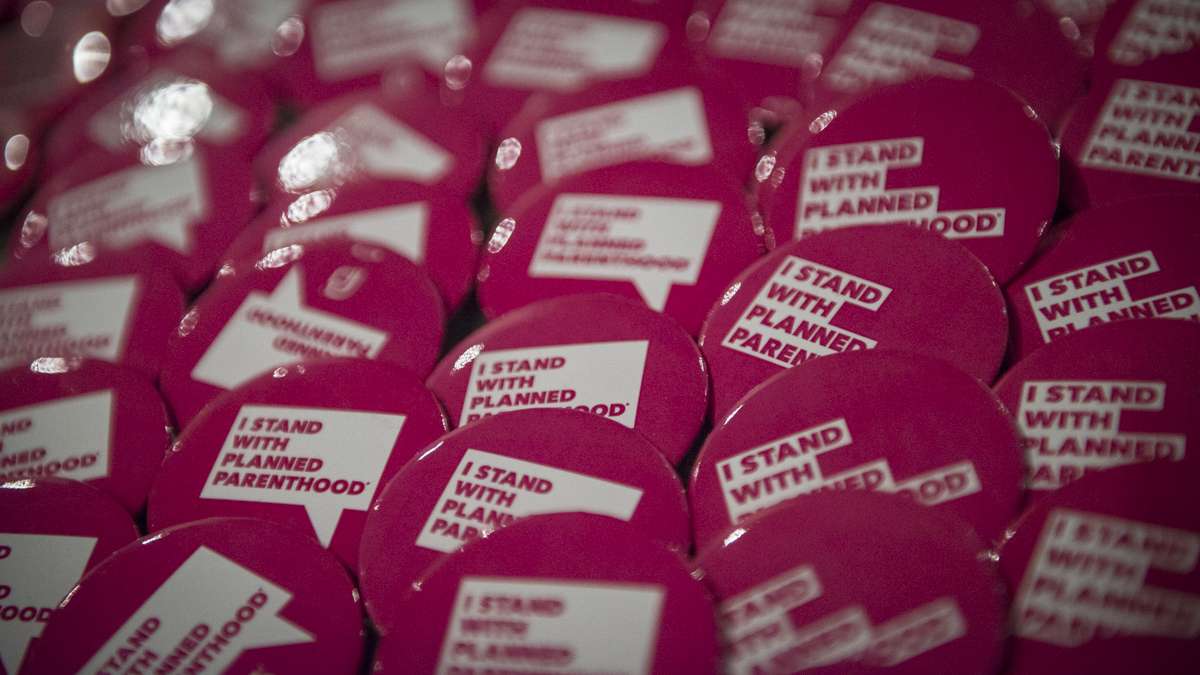Federal changes to funding of family planning spark outrage in N.J.
The Trump administration’s new rules would place further restrictions on how organizations in receipt of Title X money could operate.

Pins on display at Philadelphia Episcopal Cathedral at a Planned Parenthood event. (Branden Eastwood for WHYY)
Regulatory changes to the federal program that sustains Planned Parenthood and other women’s care providers have sparked serious concerns among healthcare advocates in New Jersey, where residents in 13 of the 21 counties depend on a single, federally funded-clinic for affordable family planning services.
On Friday, the Trump administration released a final draft of rules for the Title X program, which supports birth control, cancer screenings and other medical needs for some 4 million low-income women and families nationwide, including nearly 100,000 in the Garden State. New Jersey received $8.8 million through the program this year, which was distributed among 47 family health programs.
While federal law already bars the money from being used for abortion services, the regulatory changes outlined by the Department of Health and Human Services last week are designed to strengthen this barrier through physical and operational changes at facilities that receive Title X funding. (Planned Parenthood and other organizations are able to provide abortions using dollars from other sources.)
Advocates for women’s care said the new requirements would create significant challenges for providers, especially smaller facilities with limited resources. And in turn, they said, these changes will put at risk the healthcare of low-income women — the very people Title X was built to help. They are particularly concerned about families in counties with few options.
“The new regulations would make drastic and harmful changes to the Title X program,” said Joseph Alifante, president and CEO of the New Jersey Family Planning League, a nonprofit organization that receives and distributes the state’s share of Title X funding to organizations throughout New Jersey.
Murphy administration resistant
“Title X funded health centers are frequently the only source of health care accessible for low-income, poor and uninsured women, men and teens,” Alifante added. “Our provider network centers services around the patient, their health needs, goals and concerns.”
Gov. Phil Murphy — who has reinstated annual state funding of nearly $7.5 million for women’s healthcare programs — joined with Democratic leaders from a dozen other states to challenge the Trump administration’s proposed changes to Title X when they were first announced in June. State Attorney General Gurbir Grewal has also filed a legal challenge to a separate HHS rule change that could also limit women’s access to low-cost birth control.
The Title X changes — slated to take effect in two months — are designed to address several concerns among Trump administration officials, including that the current rules are not sufficient to protect against commingling of the restricted funds and those that can be used for abortion services.
To reduce the potential for “fungibility,” the revision requires federally-funded clinics to maintain separate physical spaces for their abortion services, distinct from where they provide other treatments and programs, as well as a separate set of financial ledgers.
Federal officials also fear that, in its current form, the law does not properly protect the conscience of those who oppose abortion in all forms. To address this concern, staff members at Title X facilities will no longer be forced to provide pregnancy counseling or discuss what options — including abortion — might be available to the patient; this will still be permitted, but not required.
A ‘gag rule’
In addition, the change flat-out prohibits staff at Title X-funded operations from recommending or referring a patient for abortion services — a change that opponents said is essentially a “gag rule” on providers.
“The administration has put health care providers like Planned Parenthood in an impossible position: withhold information from our patients, or get pushed out of a program designed to ensure that people struggling to make ends meet can still access essential reproductive health care,” said Triste Brooks, president and CEO of Planned Parenthood of Northern, Central, and Southern New Jersey. “We won’t withhold critical information from our patients.”
State Assemblywoman Valerie Vainieri Huttle (D-Bergen), a vocal advocate for women’s health, also denounced the move and urged the Trump administration to “stop playing politics” with woman’s health. “Let’s be clear, the administration is preventing health care providers from giving their patients full and accurate information about all of their options, literally “gagging” doctors,” she said.
Other changes proposed by HHS include expanding oversight of — and reporting requirements for — how the funds are distributed among providers, and any subcontracting involved; additional training and reporting around sexual abuse claims; and efforts to “encourage parent and child communications” around family planning and making it easier for family members to participate in a patient’s family-planning decisions.
Established nearly 50 years ago, the Title X program has provided a stable source of funding for facilities that are often the only care providers to low-income women and their families. Nearly half of these patients lack health insurance, according to research by the Guttmacher Institute, which tracks reproductive health issues.
Wide range of health services
This story originally appeared on NJ Spotlight.
—
In addition to free and low-cost birth control, this program provides screenings for cancer, diabetes, depression, sexually-transmitted diseases and more. In many cases, pregnancy counseling and, when appropriate, abortion referrals, are also available under current rules. Guttmacher credits Title X with preventing some 87,000 preterm or low-birth-weight babies annually — issues that can lead to a lifetime of complications — as well as tens of thousands of STDs and cancers. For every dollar invested, $7 was saved, the institute said.
The family planning program is also popular with the public, advocates note. According to a survey Planned Parenthood conducted last spring, three out of four women disapprove of the HHS change, including some who voted for the president in 2016. One in five women have taken to the streets to demonstrate against Trump, the group found.
“It is unacceptable that this administration continues to work to restrict women’s access to affordable health care,” said state Sen. Vin Gopal (D-Monmouth.) “This new rule is a blatant attack on the personal relationship between a woman and her physician, and will do great harm to the health of our residents.”
WHYY is your source for fact-based, in-depth journalism and information. As a nonprofit organization, we rely on financial support from readers like you. Please give today.



